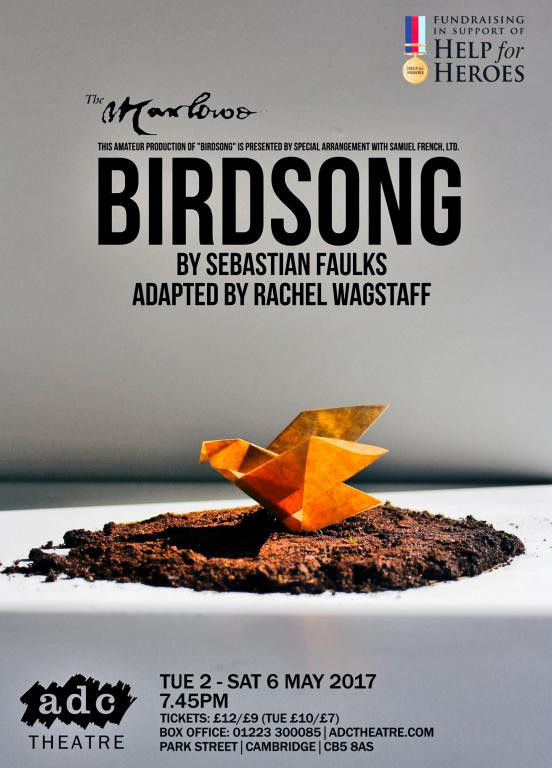
BIRDSONG
"No child or future generation will ever understand."
The heart wrenching play based on Sebastian Faulks's best-selling novel.
ADC Theatre: 2nd - 6th May 2017

Cast
Toby Waterworth: Stephen Wraysford
Conor Dumbrell: Jack Firebrace
Léa des Garets: Isabelle Azaire
Matilda Wickham: Jeanne
Jack Robson: Arthur Shaw
Ben Walsh: René Azaire
Ben Martineau: Bérard
Rachel Kitts: Lisette Azaire
Andrew Carey: Gregoire Azaire
Sabrina Gilby: Captain Gray
Joe Tyler Todd: Evans
Shimali de Silva: Colonel Barclay
Francesca Bertoletti: Marguerite
Crew
Director: Anastasia Bruce-Jones
Producer: Thomas Warwick
Set Designer: Theo Heymann
Lighting Design: Andrew Tan
Composer / Musical Director: Noah Fram
Sound Design: Jay Carpenter
Costume Design: Lisa Bernhardt
Stage Manager: Amelia Parker
Assistant Director: Joe Richards / Ellie Cole
Publicity: Lewis Scott

Director's Notes
I knew coming into this project the single most important thing would be to put together a respectful, reflective portrayal of the horrors and humanity of the First World War, especially since we are doing it in one of the centenary years.
For me, part of putting together a respectful production was tied up in making it as good as possible, to work as hard as we could to put on a real demonstration of respect and pride in the men that fought and died for us. So right through casting and putting together a production team I focused on finding people who were hardworking and ambitious; we ended up with one of the most accomplished and professional teams I have ever known for a Cambridge show. It shows particularly in the attention to detail that each and every member of the team has put in. The actors have each done an enormous amount of research on the period and their whole character background along with everything that entails (right down to getting the correct accent for the province in France where they would have grown up). The set, which is as complicated as other shows with ten times the budget and time, marks details such as Stephen’s obsession with birds with a small wooden carving of an owl, and the French bar is strewn with actual posters from 1917 France. Even the colour and texture of the earth used for the poster was carefully planned and sourced.
One of the most affecting moments of the process was everyone having a military workshop to ensure saluting, marching, military carriage and proper deference between the ranks was accurate. This was something of particular significance to me; it felt important to have the military aspect properly researched and respected. Having grown up in a semi-military environment (my father was in the Royal Marines) I know how immensely significant the War still is, particularly to those who have served the country, and how important it would be to accurately represent not only the horrors of the trenches, but the moments where human strength triumphed against the odds: the friendships; the bravery; the camaraderie and laughter; the acts of unexpected kindness.
One thing that was always clear, and which actually became a part of respecting the military side of the play, is the way the show presents at its heart people and not war. It humanises and personalises our now-distant image of the First World War soldier, so that we understand them as everyday people. Which, of course, makes their sacrifice so much the greater. This personalisation seemed to be tied up in the letters and diaries that the soldiers kept – particularly Stephen – in the play. The production itself often draws on this theme: the paper birds on the walls; the sketched projections; the gauzes which fly in and out like pages turning; the watercolour-esque sky at the back of the stage; and, of course, the symbol of the folded bird which is both on our publicity and can be created following the instructions.
When my father was in Afghanistan I remember receiving a blue letter from him. It was incredibly special to have his writing in my hands, even though I knew it had been sent weeks before. I could hear his voice when I read it, and could almost see the back of his hand writing it. This is the feeling I want the audience to have when they hear the letters that the soldiers write from the front line.
For my part, it has been immensely special holding this play in my hands. Now, it is ready to fly.
REVIEWS



